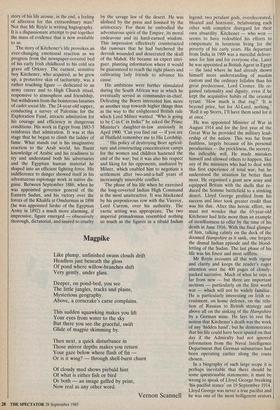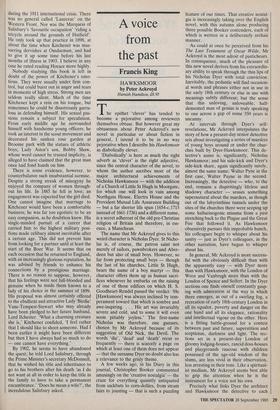A great imperial warrior
Hugh Cecil
THE KITCHENER ENIGMA by Trevor Royle
Michael Joseph, £15
After a course of years every soldier acquires more or less insanity; the result of his moral training,' the writer David Lind- say, who served in the first world war, noted in his journal. Certainly, no defini- tion of sanity can be fully applied to Field Marshal Lord Kitchener, Britain's greatest imperial warrior. He had the lonely soul of a despot; there was a psychopathic quality about his brutality and zest for revenge when they were aroused; his desire for honours was blatant and insatiable; he helped himself without shame to other men's treasures; he could take bitter off- ence about trivial matters of protocol and give it freely and without feeling to others.
Why, then, does this admirably told story of his life arouse, in the end, a feeling of affection for this extraordinary man? Not that Mr Royle is writing hagiography. It is a dispassionate attempt to put together the mass of evidence that is now available to us.
The story of Kitchener's life provokes an ever-changing emotional reaction as we progress from the newspaper-covered bed of his early Irish childhood to his cold sea grave off Orkney. The earnest, sensitive boy Kitchener, who acquired, as he grew up, a protective skin of taciturnity, was a rather touching figure — dedicated to an army career and to High Church ritual, responsive to atmosphere and friendship, but withdrawn from the boisterous fatuities of cadet social life. The 24-year-old sapper, conducting a survey of Palestine for the Exploration Fund, attracts admiration for his courage and efficiency in dangerous conditions. His work in Egypt from 1883-5 reinforces that admiration. It was at this stage that he began to climb the ladder of fame. What stands out is his imaginative reaction to the Arab world, his fluent knowledge of Arabic and his readiness to try and understand both his adversaries and the Egyptian human material he shaped into an efficient fighting force. His indifference to danger showed itself in his adventurous espionage work in native dis- guise. Between September 1886, when he was appointed governor general of the Eastern Sudan, and his victory over the forces of the Khalifa at Omdurman in 1898 (he was appointed Sirdar of the Egyptian Army in 1892) a much more alarming, if impressive, figure emerged — obsessively thorough, dictatorial, and inured to cruelty by the savage law of the desert. He was idolised by the press and lionised by the aristocracy. For them he embodied the adventurous spirit of the Empire, its moral endeavour and its hard-earned wisdom. This impression effectively counteracted the rumours that he had butchered the dervish wounded and desecrated the skull of the Mandi. He became an expert intri- guer, planting information where it would be guaranteed to reach the right places and cultivating lady friends to advance his cause.
His ambitions were further stimulated during the South African war in which he eventually served as commander-in-chief. Defeating the Boers interested him more as another step towards higher things than as the way to the enlightened British rule which Lord Milner wanted. 'Who is going to be C-in-C in India?' he asked the Prime Minister's daughter-in-law anxiously in April 1900. 'Can you find out — if you are at Hatfield remember me to His Lordship. . . .' His policy of destroying Boer agricul- ture and constructing concentration camps for the women and children hastened the end of the war; but it was also his respect and liking for his opponents, unshared by Milner, which enabled him to negotiate a settlement after two-and-a-half years of increasingly miserable conflict.
The phase of his life when he exercised the long-coverted Indian High Command is the most unattractive. It was blackened by his preposterous row with the Viceroy, Lord Curzon, over his authority. The exotic setting was appropriate. The two imperial primadonnas resembled nothing so much as the figures in a ribald Indian legend: two petulant gods, overdecorated, bloated and histrionic, belabouring each other with complete disregard for their own absurdity. Kitchener — who won seems to have redoubled his efforts to compensate in luxurious living for the poverty of his early years. His departure from India in 1909 was a merciful deliver- ance for him and for everyone else. Later he was appointed as British Agent in Egypt — the land where he had already shown himself more understanding of muslim custom and the ordinary fellahin than his great predecessor, Lord Cromer. He re- gained rationality and dignity, even if he kept the acquisitive habits of the oriental tyrant: 'How much is that rug?' It is beyond price, but for Al-Lurd, nothing.' `Roll it up Storrs, I'll have them send for it at once.'
He was appointed Minister of War in August 1914 and for the first year of the Great War he provided the military lead- ership of the nation. This was far from faultless, largely because of his personal peculiarities — the prickliness, the secrecy, the inflexible will. He made mistakes himself and allowed others to happen, like any of the ministers who had to deal with this first experience of total war; but he understood the situation far better than most. He organised a giant new army and equipped Britain with the shells that re- duced the Somme battlefield to a stinking desert. Lloyd George profited from his success and later took greater credit than was his due. After this heroic effort, we must not wonder that the 65-year-old Kitchener had little more than an example of steadfastness to offer by the time of his death in June 1916. With the final glimpse of him, talking calmly on the deck of the doomed Hampshire as it sank, one forgets the dismal Indian episode and the blood- letting of the Sudan. The last phase of his life was his finest and most selfless.
Mr Royle recounts all this with vigour and clarity and keeps the reader's eager attention over the 400 pages of closely- packed narrative. Much of what he says is far from new — but there are important sections — particularly on the first world war — which will not be widely familiar. He is particularly interesting on Irish re- cruitment, on home defence, on the rela- tion of Russian to British strategy and above all on the sinking of the Hampshire by a German mine. He lays to rest the notion that Kitchener's death was the work of any 'hidden hand'; but he demonstrates that his life could have been spared on that day if the Admiralty had not ignored information from the Naval Intelligence Department that German submarines had been operating earlier along the route chosen.
In a biography of such large scope it is perhaps inevitable that there should be some questionable statements; it must be wrong to speak of Lloyd George breaking `his pacifist stance' on 19 September 1914. Lloyd George was never a true pacifist and he was one of the most belligerent orators during the 1911 international crisis. There was no general called `Lanzerac' on the Western Front. Nor was the Marquess of Salisbury's 'favourite occupation' riding a tricycle around the grounds of Hatfield'. He only took up that practice in 1898, at about the time when Kitchener was mas- sacring dervishes at Omdurman, and had to give it up some time before his last months of illness in 1903. I believe in any case he rated reading Horace more highly.
Nobody studying this book is left in doubt of the power of Kitchener's emo- tions. They were usually under firm con- trol, but could burst out in anger and tears in moments of high stress. Strong men are seldom really silent. Much of the time Kitchener kept a rein on his tongue, but sometimes he could be disastrously garru- lous in defending himself. His sexual pas- sions remain a subject for speculation. From early middle age he surrounded himself with handsome young officers; he took an interest in the scout movement and decorated his sunken rose garden at Broome park with the statues of athletic boys; Lady Astor's son, Bobby Shaw, whose word cannot be trusted implicity, is alleged to have claimed that the great man once laid fond hands on him.
There is some evidence, however, to counterbalance such insubstantial surmise. Despite a strong streak of misogyny he enjoyed the company of women through- out his life. In 1885 he fell in love; an engagement was expected but the girl died. One cannot imagine that marriage to Kitchener would have been a comfortable business; he was far too egotistic to be an easy companion, as he doubtless knew. His single-minded pursuit of a career that carried him to the highest military posi- tions made celibacy almost inevitable after a certain age. This did not prevent him from looking for a partner until at least the start of the Boer War. It seems that on each occasion that he returned to England, with an increasingly glorious reputation, he was advised by friends to enhance his connections by a prestigious marriage. There is no reason to suppose, however, that his feelings were not full-blooded and genuine when he made them known to a lady of his choice in the summer of 1899. His proposal was almost certainly offered to the ebullient and attractive Lady 'Birdie' Vane-Tempest-Stewart who may already have been pledged to her future husband, Lord Ilchester. 'What a charming creature she is,' Kitchener confided, 'I feel rather that I should like to shoot someone. Had I been earlier it might have been different but then I have always had so much to do — one cannot have everything.'
By 1902, he seems to have abandoned the quest; he told Lord Salisbury, through the Prime Minister's secretary McDonnell, that he wished his title and inheritance to go to his brothers after his death 'as I do not want at all in order to keep the title in the family to have to take a permanent encumbrance.' Does he mean a wife?', the incredulous Salisbury asked.
















































 Previous page
Previous page